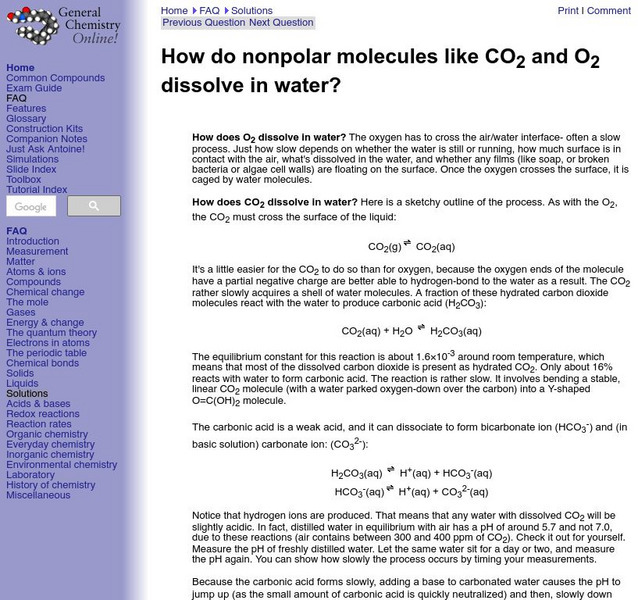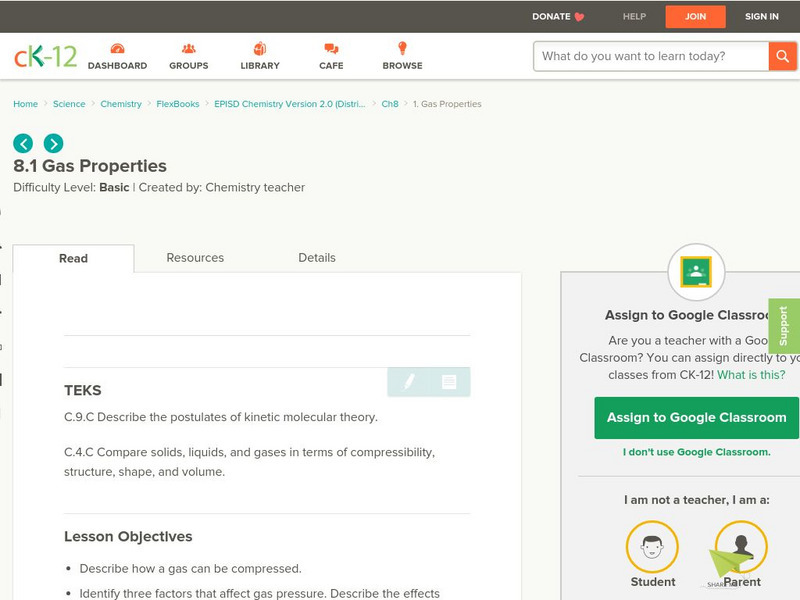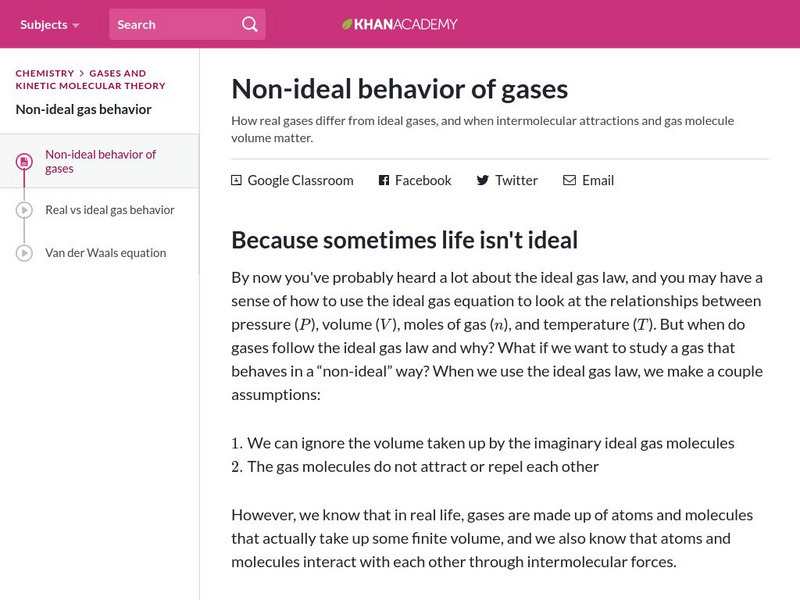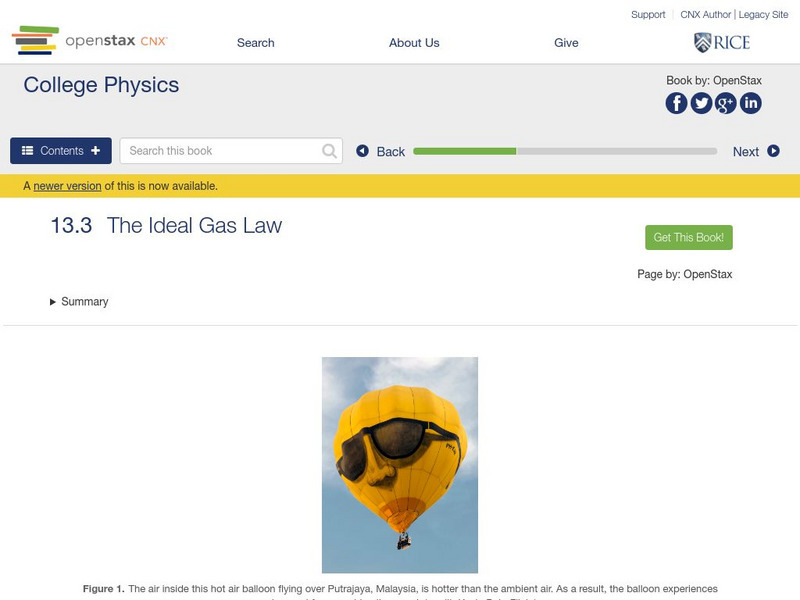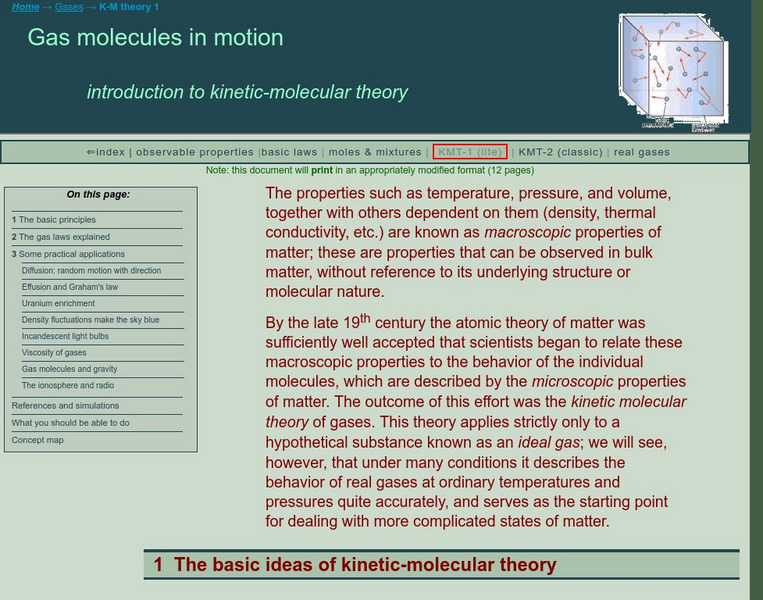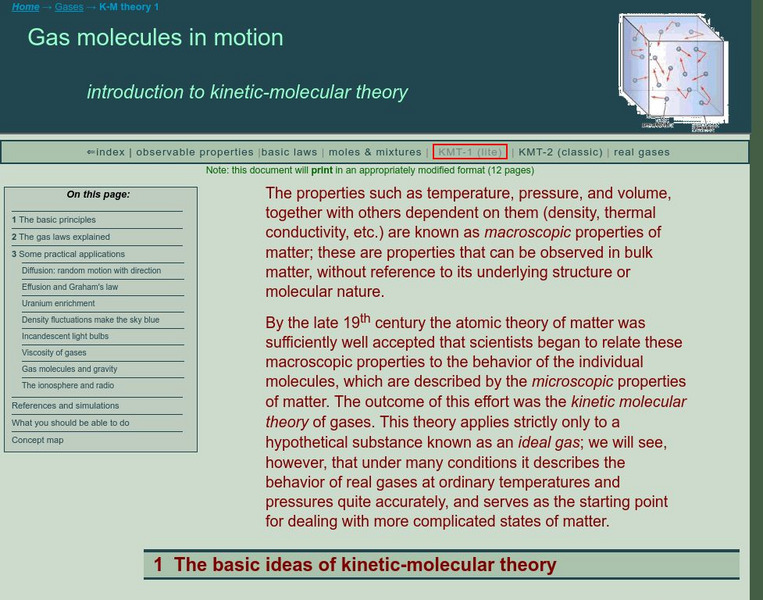Simon Fraser University
Chem1 Virtual Textbook: Velocities of Gas Molecules and Boltzmann Distribution
The General Chemistry Virtual Textbook, or Chem 1, is broken into several sections covering various aspects of topics related to chemistry. This section deals with both Boltzmann Distribution and the velocity of gas molecules.
University of Colorado
University of Colorado: Ph Et Interactive Simulations: Molecules and Light
Do you ever wonder how a greenhouse gas affects the climate, or why the ozone layer is important? Use the sim to explore how light interacts with molecules in our atmosphere.
University of Colorado
University of Colorado: Ph Et Interactive Simulations: University of Colorado: Gas Properties
Pump gas molecules to a box and see what happens as the volume changes, add or remove heat, change gravity, and more. Measure the temperature and pressure, and discover how the properties of the gas vary in relation to each other....
Texas Education Agency
Texas Gateway: Atomic and Molecular Explanation of Pressure and Temperature
Learn how to calculate the kinetic energy of a gas molecule, describe the relationship between the temperature of a gas and the kinetic energy of atoms and molecule, and describe the distribution of speeds of molecules in a gas. The...
Texas Education Agency
Texas Gateway: The Ideal Gas Law
By the end of this section, you will be able to state the ideal gas law in terms of molecules and in terms of moles; use the ideal gas law to calculate pressure change, temperature change, volume change, or the number of molecules or...
Frostburg State University
University of Frostburg: How Nonpolar Molecules Dissolve
This site from the University of Frostburg provides an explanation of the process by which nonpolar molecules dissolve in water.
CK-12 Foundation
Ck 12: Gas Properties
[Free Registration/Login may be required to access all resource tools.] The following online tutorial describes how a gas can be compressed and identifies three factors that affect gas pressure. Students will describe the effects...
Khan Academy
Khan Academy: Non Ideal Behavior of Gases
Find out how real gases differ from ideal gases, and when intermolecular attractions and gas molecule volume matter.
American Chemical Society
Middle School Chemistry: Air: It's Really There
Investigation shows that gas takes up space and has mass, and that the motion of gas molecules is affected by heating and cooling.
Texas Education Agency
Texas Gateway: The Ideal Gas Law
Explore the thermal behavior of gases, in particular, examine the characteristics of atoms and molecules that compose gases. Learn about the ideal law of gases in terms of molecules and moles. Multiple formulas and examples are provided.
OpenStax
Open Stax: College Physics: The Ideal Gas Law
A section in a college textbook exploring the ideal gas law in relation to molecules and in terms of moles. Learn how to calculate the variables in the ideal gas law. Also become familiar with Avogadro's number and how to use it to...
OpenSciEd
Open Sci Ed: Net Logo: Gas Particle Motion and Temperature
This simulation explores the relationship between the temperature of a gas, the motion of the particles in the gas and the changes in the kinetic energies of particles during collisions.
University Corporation for Atmospheric Research
Ucar: Just a Phase: Water as a Solid, Liquid, and Gas
This site helps students construct a model of the arrangement of water molecules when present as solid, liquid or gas. Includes background information, lesson plans, links to standards and assessment ideas.
Museum of Science
The Atom's Family: Mighty Molecules
In this activity, students construct models of molecules using marshmallows and gum drops.
American Chemical Society
Middle School Chemistry: Chapter 5: The Water Molecule and Dissolving
Nine exemplary chemistry lessons about the water molecule and dissolving complete with handouts and animations.
State University of New York
State University of New York: Kinetic Molecular Theory
This module simulates the behavior of a small number of gas molecules in a small box.
Texas Education Agency
Texas Gateway: Kinetic Theory: Atomic & Molecular Explanation of Pressure & Temp
By the end of this section, you will be able to express the ideal gas law in terms of molecular mass and velocity; define thermal energy; calculate the kinetic energy of a gas molecule, given its temperature; describe the relationship...
Simon Fraser University
Chem1 Virtual Textbook: Molecules in Motion
As part of the General Chemistry Virtual Textbook, this site continues a study conducted on various topics related to gases. As a specific topic, the site covers an introduction to kinetic molecular theory.
Other
Beautiful Chemistry: Beautiful Structures: Gas and Liquid
In Beautiful Chemistry, we talk about crystals, quasicrystals and glasses, which are all solids. Here, we see the molecular structure of gases and liquids.
University of Florida
Chem. 2041 Lecture Notes: The Forces Between Molecules
A discussion of the variety of forces which hold molecules together. The relative strengths of these forces for the various states of matter is discussed. The effect of such forces on the boiling points and other phase change...
OpenSciEd
Open Sci Ed: Net Logo: Gas Particle Collisions Up Close
This simulation explores the relationship between particle kinetic energies during particle collisions.
Concord Consortium
Concord Consortium: Gas Pressure in a Syringe
Explore why it is difficult to pull back on a capped syringe and why the plunger moves back in when you let go.
Simon Fraser University
Chem1 Virtual Textbook: Kinetic Molecular Model
The General Chemistry Virtual Textbook, or Chem 1, is broken into several sections covering various aspects of topics related to chemistry. This section deals with the basic components of the Kinetic-Molecular Theory in addition to...
Other
Virtual Chembook: Density Applications With Gases
DENSITY is a physical property of matter, as each element and compound has a unique density associated with it. Density defined in a qualitative manner as the measure of the relative "heaviness" of objects with a constant volume. For...







